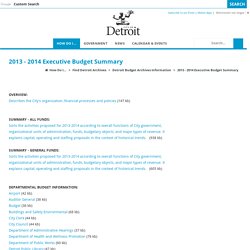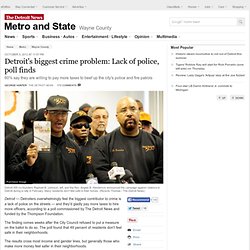

Violent crime down 13% in Detroit, FBI records show. It’s been a year since Vaughn Arrington was carjacked outside his house on Pelkey in Detroit.

Arrington was discussing a youth jobs program with a woman from Cleveland when a gunman assaulted the woman and drove off in Arrington’s Ford Mustang. Despite the incident, Arrington, 34, who installed video cameras on his east side property last year to record criminals, said crime is down in his neighborhood. “I’ve been the victim, but I’m telling you, things are getting better,” he said.
New FBI statistics released Monday show violent crime dropped 13 percent in Detroit in 2015 compared to the year before, setting it apart from other major cities such as Chicago. The Illinois city’s spike has made violent crime there and nationwide a hot topic on the presidential campaign trail. Chicago reported 25,663 violent crimes in 2015, up from 24,085 a year earlier while nationally, the violent crime rate rose 3.9 percent.
Among those were Warren, Dearborn, Lansing and Grand Rapids. nterry@detroitnews.com. Fewest cops are patrolling Detroit streets since 1920s. Detroit — There are fewer police officers patrolling the city than at any time since the 1920s, a manpower shortage that sometimes leaves precincts with only one squad car, posing what some say is a danger to cops and residents.

Detroit has lost nearly half its patrol officers since 2000; ranks have shrunk by 37 percent in the past three years, as officers retired or bolted for other police departments amid the city's bankruptcy and cuts to pay and benefits. Left behind are 1,590 officers — the lowest since Detroit beefed up its police force to battle Prohibition bootleggers. "This is a crisis, and the dam is going to break," said Mark Diaz, president of the Detroit Police Officers Association. "It's a Catch-22: I know the city is broke, but we're not going to be able to build up a tax base of residents and businesses until we can provide a safe environment for them. " Police Chief James Craig acknowledges he doesn't have as many officers as he'd like. Staffing challenges. Detroit Budget Archives Information. OVERVIEW:Describes the City's organization, financial processes and policies (147 kb) SUMMARY - ALL FUNDS:Sorts the activities proposed for 2013-2014 according to overall functions of City government, organizational units of administration, funds, budgetary objects, and major types of revenue.

It explains capital, operating and staffing proposals in the context of historical trends. (938 kb) SUMMARY - GENERAL FUNDS:Sorts the activities proposed for 2013-2014 according to overall functions of City government, organizational units of administration, funds, budgetary objects, and major types of revenue. It explains capital, operating and staffing proposals in the context of historical trends. As Detroit breaks down, scourge of arson burns out of control. Detroit's biggest crime problem: Lack of police, poll finds. Detroit — Detroiters overwhelmingly feel the biggest contributor to crime is a lack of police on the streets — and they'd gladly pay more taxes to hire more officers, according to a poll commissioned by The Detroit News and funded by the Thompson Foundation.

The finding comes weeks after the City Council refused to put a measure on the ballot to do so. The poll found that 49 percent of residents don't feel safe in their neighborhoods. The results cross most income and gender lines, but generally those who make more money feel safer in their neighborhoods. The survey also found that residents have mixed views of the Police Department, but generally liked Police Chief Ralph Godbee.
Detroit Rising: Life after bankruptcy. One year after a federal judge approves Detroit's bankruptcy exit plan, progress has been made while looming challenges remain, especially city pensions The City of Detroit has more than enough cash to pay its daily bills.

Thousands of busted streetlights have been replaced. City retirees still receive pension checks, and valuable paintings remain ensconced in the gilded halls of the Detroit Institute of Arts. That's the good news. But a year after a federal judge approved a cost-cutting and reinvestment plan in the nation's largest-ever municipal bankruptcy case, Detroit's financial future still hangs in the balance. Among the greatest concerns: a multibillion-dollar pension bill that starts coming due in less than a decade. The city is on the hook to make a balloon pension payment estimated at more than $100 million in 2024 alone. So far, the early returns for the investments since the bankruptcy are falling short.
It was officially known as a plan of adjustment. None came true. Peter J. 9 ways Detroit is changing after bankruptcy. When Detroit filed for bankruptcy last July, observers around the world were shocked by how far some city services had deteriorated -- though it was no secret to residents.

Average police response times clocked in at almost an hour. Tens of thousands of broken streetlights meant entire streets go dark at nightfall. And though Detroit has more than 200 municipal parks, the city could only afford to keep about a quarter of them open. How has the city changed since it entered bankruptcy? Detroit's public services have shown some improvement in the last year but still have a long way to go before they're at adequate levels.
The Detroit Police Department says it is focused on hiring non-uniformed administrative staff so that it can move officers from desk duty to street patrols to concentrate on high-crime areas and react in real time to crime trends. DPD's response time is improving, but it still lags national standards in responding to high-priority crimes such as homicides.